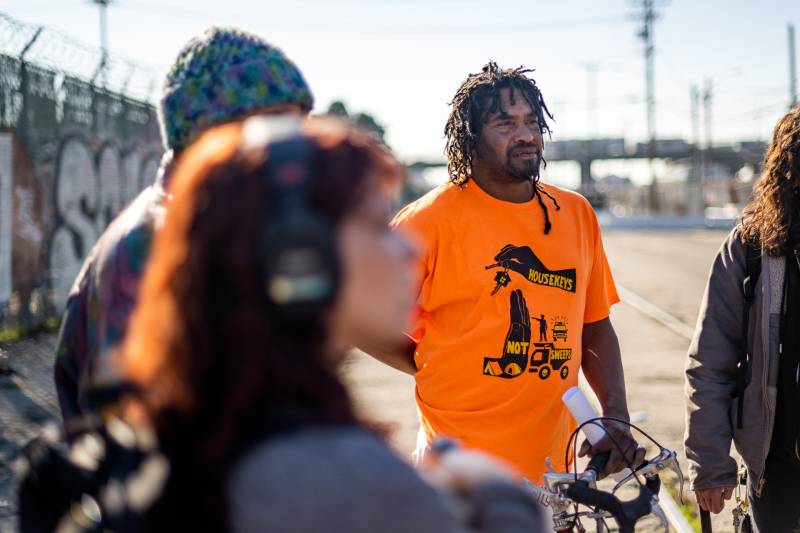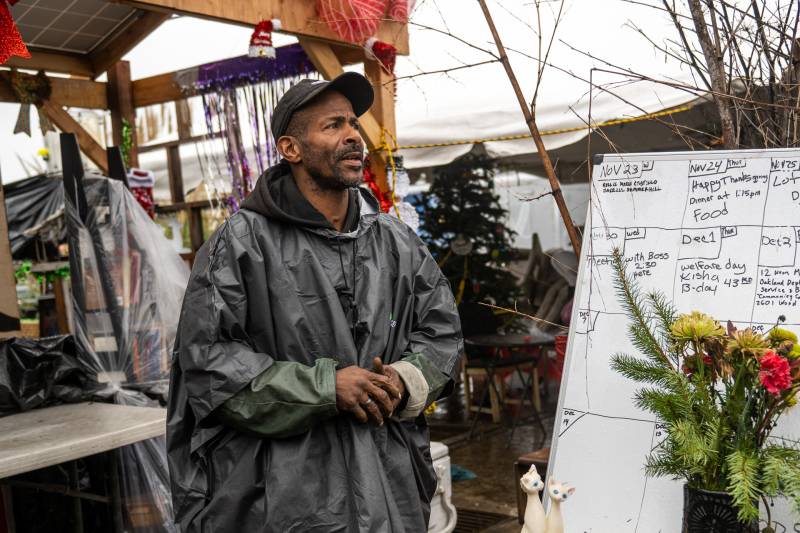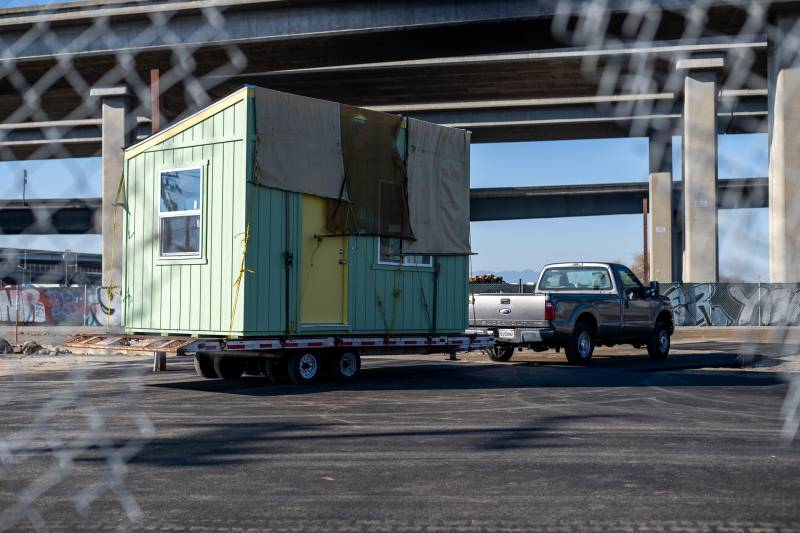On Friday, a federal district judge will decide whether evictions at one of Oakland’s longest-running settlements of unhoused people can proceed.
Last Remaining Portion of Oakland's Largest Homeless Encampment Faces Eviction

The Wood Street Commons, home to upwards of 60 people, is the last remaining segment of a larger settlement that ran parallel to Wood Street in West Oakland, mostly under the Interstate 880 freeway. The expansive site at one time stretched for more than 25 city blocks with an estimated 300 people living there.
Caltrans evicted the bulk of the residents from land it owns this past September. But the Wood Street Commons, which sits on a city-owned plot of land directly across from Raimondi Park, was not part of that earlier effort.
Now, Oakland officials are ordering everyone to leave. In a statement earlier this month, officials said they want to begin developing 170 units of affordable housing at the site.

“I’m scared now,” said Wood Street resident and organizer John Janosko. “Where do we go from here? What do we do?”
City officials said they need to clear the site to begin soil testing and assess which kinds of environmental remediation are needed before housing can be built there. If all goes smoothly, the site will be ready for occupancy in 2027 or 2028.
“The city of Oakland is committed to addressing both the needs of the unhoused on the lot and other residents needing shelter and housing,” Assistant City Administrator LaTonda Simmons said in a statement. “The longer we delay, the more this critical project to house vulnerable Oaklanders is put at risk. Ultimately, we know the solution to homelessness is housing.”
But, residents of the Commons counter that they have already found a solution to homelessness. And, that solution is the Commons.

The site has a communal kitchen, a free store where residents can access donated clothes and other household items, and a receiving area for newcomers in the form of an outdoor living room that also doubles as an event and meeting space. And it has something that’s harder to recreate elsewhere: a strong sense of solidarity.
“Anybody can come here at any time of the day or night if they need a place to sleep,” said Lydia Blumberg, who has lived at the Commons for around five years. “They can come here, and they can be safe, and they can have people around them that are going to protect them.”

Earlier this month, residents held a press conference to appeal to city officials to stay the evictions. LaMonte Ford, a resident and organizer, said that rather than bulldozing the site, the city should funnel more resources to help improve and strengthen it.
He’d like to see dumpsters, electricity and showers, not to mention housing counselors to place people into permanent homes, mental health services, job postings and other services.
“It costs more money to open additional sites,” Ford said.
The city received $4.7 million from the state to move people from the Commons to a temporary tiny-cabin community a few blocks away. It had planned to begin evicting residents from the Commons on Jan. 9.

But, residents filed for a temporary restraining order, citing the historic storms ravaging the state. And, the tiny-cabin community the city had planned to open wasn’t ready for residents to move in.
Federal District Judge William Orrick — the same judge who presided over a similar restraining order in Caltrans’ evictions — agreed.
“This group has been at the encampment for a considerable period of time,” Orrick told an attorney representing Oakland at the Jan. 6 hearing. “You can wait 10 days.”
But, by the date of the next hearing on Jan. 18, city officials said they actually weren’t ready. In court documents, Oakland attorney Jamilah Jefferson said the cabin community would have more than 30 of the 100 planned spaces available — but not before Feb. 1. Officials had also offered residents safe RV parking spots at a lot in East Oakland, but those, too, weren’t ready in January.
“The Wood Street parcel remains slated for a much needed 100% affordable housing development project,” Jefferson wrote in the court filing. “However, the city is also cognizant of the need to have adequate shelter available to comply with federal law as well as its own policies.”

Many residents, however, are wary of the new tiny-cabin site. Some have even returned to the Commons after having negative experiences at other tiny-cabin locations throughout the city.
Jared DeFigh moved to one of Oakland’s tiny-cabin sites after Caltrans evicted him from its land behind Wood Street this past September. He said the thin walls, which have no insulation, left him freezing at night. He couldn’t bring many possessions, which left him without warm blankets. He has since moved back to the Commons.
“You can see your breath each morning. All you get is a prison blanket and four socks,” he said. “I had to flee that to sleep by that tree [at the Commons], and then set up a tent somebody gave me.”
But beyond the physical discomfort, DeFigh said there was a lack of care and attention to his needs at the cabin community that he does receive at the Commons.
“This community loves me for me, not because I’m just some person that’s downtrodden and needs help,” he said. “I am a human being with thoughts and feelings and a whole future before me.”
If Orrick lifts the restraining order Friday, a spokesperson for the city said workers will post notices at the Commons, giving residents a minimum of seven days’ advance notice before the evictions begin.
